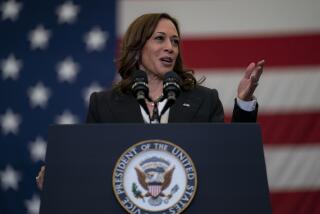Who will lead progressives after Bernie Sanders?
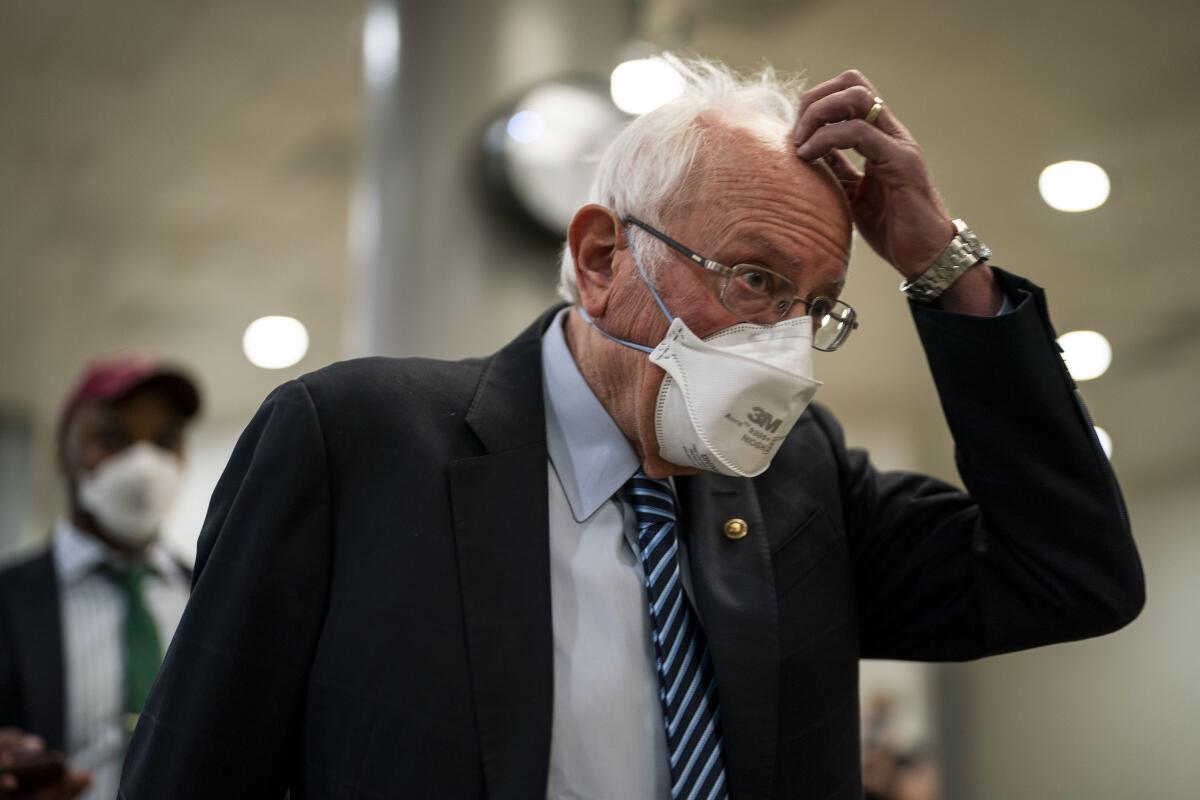
- Share via
WASHINGTON — With President Biden planning to run for reelection in 2024, the next likely opportunity for another Democrat to launch a viable White House bid will be 2028.
For progressives, that means their movement’s longtime champion and two-time presidential candidate, Sen. Bernie Sanders (I-Vt.), will be 87 — likely too old for another run.
So the search has already begun to find another charismatic, unifying leader for the left wing of the Democratic Party.
“The most singular thing that progressive voters are looking for is someone who has a bold, progressive vision that is not purely idealistic but is also implementable, and that the candidate also has the ability to organize masses of people to implement that agenda,” said Joseph Geevarghese, executive director of Our Revolution, a grassroots organization founded by Sanders.
Here’s a look at some progressives in Congress who might be angling to take the reins:
Sen. Elizabeth Warren (D-Mass.)
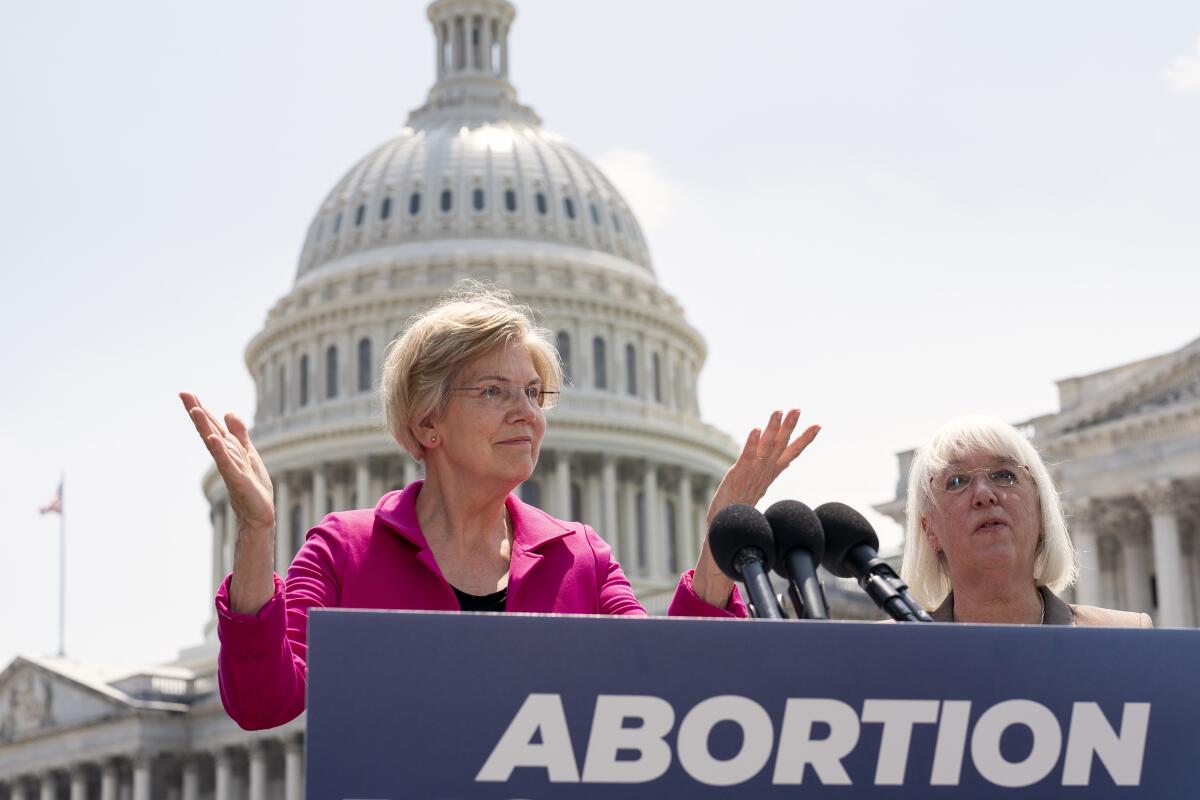
At 73, Warren is younger than Sanders, 81; Biden, 79; and House Speaker Nancy Pelosi (D-San Francisco), 82. Warren has said she’ll seek reelection to her Senate seat in 2024 while backing Biden for president. If she’s reelected, Warren will have a prominent platform should she decide to launch a second White House bid in 2028.
While she would not represent a new generation, she has the experience of having run a presidential campaign, during which she was considered the front-runner at one point.
A policy wonk with a plan for seemingly every American problem, Warren was the last major female candidate standing before her departure made the 2020 Democratic primary a two-man race between Biden and Sanders.
While Sanders was uniquely able to unite a range of progressives — young and old, educated and working-class — in that contest and in his 2016 primary race against Hillary Clinton, Warren’s appeal is narrower.
A 2021 Pew Research Center survey found Warren was more popular among the “progressive left” — “very liberal, highly educated and majority white” voters — than the “outsider left” — “young, liberal, discontented Democrats.”
Rep. Alexandria Ocasio-Cortez (D-N.Y.)
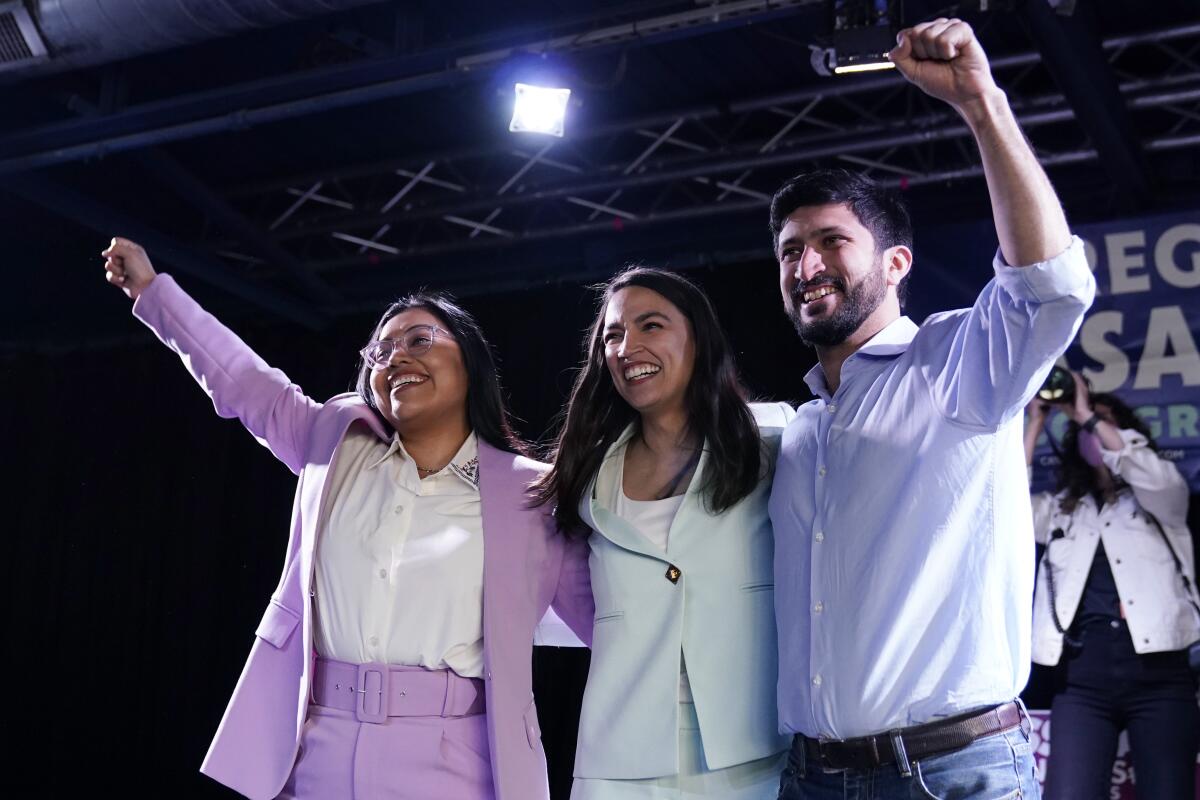
Ocasio-Cortez celebrated her 33rd birthday in October. While some might see Warren as too old for a presidential run in 2028, others might consider Ocasio-Cortez too young.
She won’t even meet the constitutional age requirement to run for president in 2024 until a little more than three weeks before the election. Maybe that’s why she connects so well with young voters.
Ocasio-Cortez leans into her youth. On her personal Instagram account, which boasts 8.6 million followers, her videos often surpass 1 million views. She has an even larger following — 13.5 million — on Twitter, where she’s unafraid to engage.
Take the pinned tweet, for example, at the top of her page: From her iPhone in late June, she tweeted a screenshot of another user’s tweet reading, “@AOC is posting about how people can skirt abortion bans.” “Yeah,” she wrote, “and?”
“AOC is a tremendous talent at such a young age,” said Mark Longabaugh, a former senior advisor to Sanders’ presidential campaign. “Just prodigy-like.”
Ocasio-Cortez won election to Congress in the 2018 Democratic wave, which ushered in “the Squad” — Ocasio-Cortez and Reps. Ayanna Pressley (D-Mass.), Ilhan Omar (D-Minn.) and Rashida Tlaib (D-Mich.). A first-time candidate, she upset then-House Democratic Caucus Chairman Joseph Crowley (D-N.Y.) in the primary.
Her star power has continued to grow in the years since, but even she’s unsure whether it could ever rise enough for the presidency.
As popular as she is on the left, she’s as deeply reviled on the right, which has led to concerns for her safety.
In a recent GQ cover story, Ocasio-Cortez said her time on Capitol Hill had shown her how deeply some people in America hate women, particularly women of color.
“People ask me questions about the future,” she told the magazine. “And realistically, I can’t even tell you if I’m going to be alive in September. And that weighs very heavily on me.”
Rep. Ro Khanna (D-Fremont)
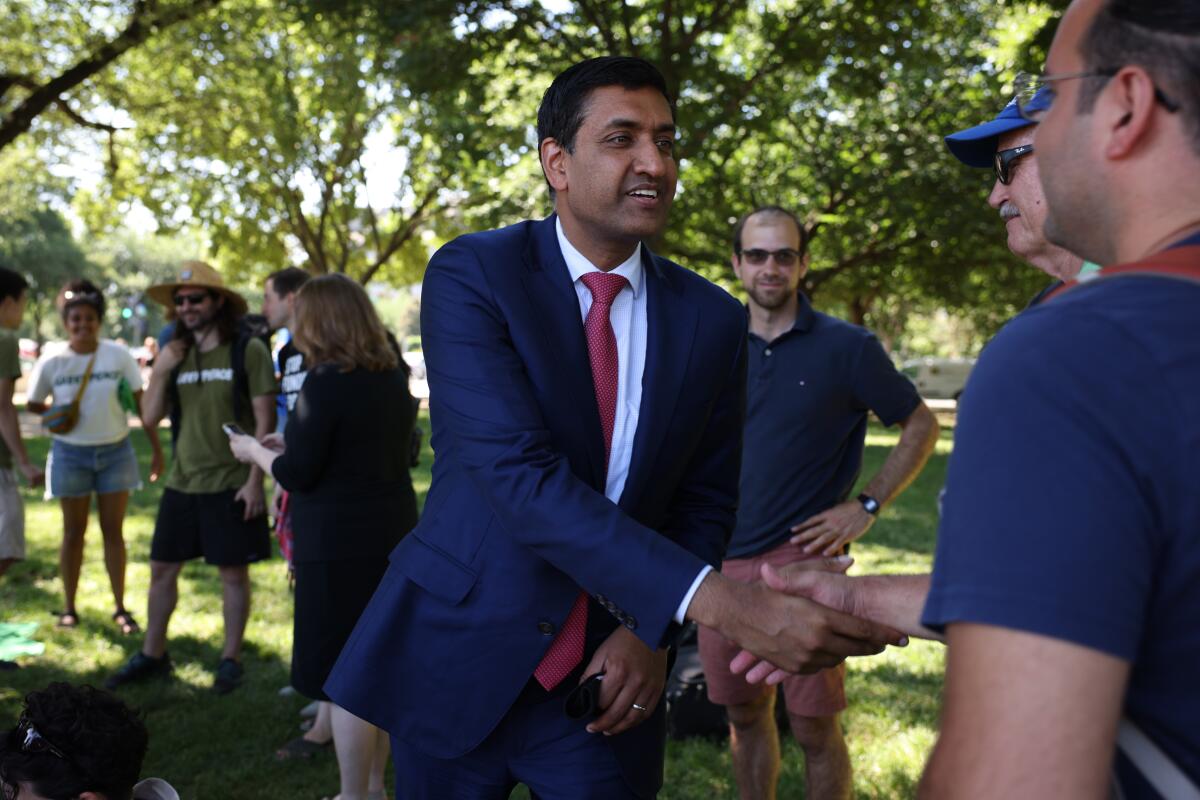
California is home to Vice President Kamala Harris, Gov. Gavin Newsom, Pelosi, Sen. Alex Padilla, House Intelligence Committee Chairman Adam B. Schiff and the front-running Los Angeles mayoral candidate, Rep. Karen Bass, among many other Democratic leaders.
But for some, Ro Khanna, a congressman from Silicon Valley, is the most worthy of presidential buzz.
Khanna, who co-chaired Sanders’ presidential campaign in 2020 and unsuccessfully urged Biden to tap Warren as his running mate, pitches a message of economic patriotism and is the rare Democrat willing to speak to a Fox News audience. His supporters believe he could attract a mix of Democrats, independents and moderate Republicans as a presidential candidate.
A pair of former Sanders advisors who have privately encouraged him to consider seeking the presidency believe Khanna is at least laying the groundwork for a future campaign. He published a book this year and worked on major legislation, including the Inflation Reduction Act and the CHIPS and Science Act.
His travel schedule in the last few months took to some battleground states and traditional early primary states, including Nevada, Wisconsin, Iowa, Pennsylvania and New Hampshire.
“There is no better way to prepare to run for president than to go out and actually talk to real people in their communities, in their workplaces, and find out what their concerns are,” said Jeff Weaver, who managed Sanders’ 2016 presidential campaign. “That one-on-one, face-to-face contact with everyday Americans is critically important to being an effective candidate for president. Ro Khanna’s been doing that ... if he should decide to run, I think it will benefit him greatly.”
One hurdle Khanna would have to overcome is his lack of name recognition. While allies believe he can articulate a winning message on the economy, he would need to raise his national profile to be able to communicate that message to the masses and raise campaign funds. They also warn that he may need to develop some sharp elbows to succeed in the rough-and-tumble of a presidential campaign.
Rep. Jamaal Bowman (D-N.Y.)
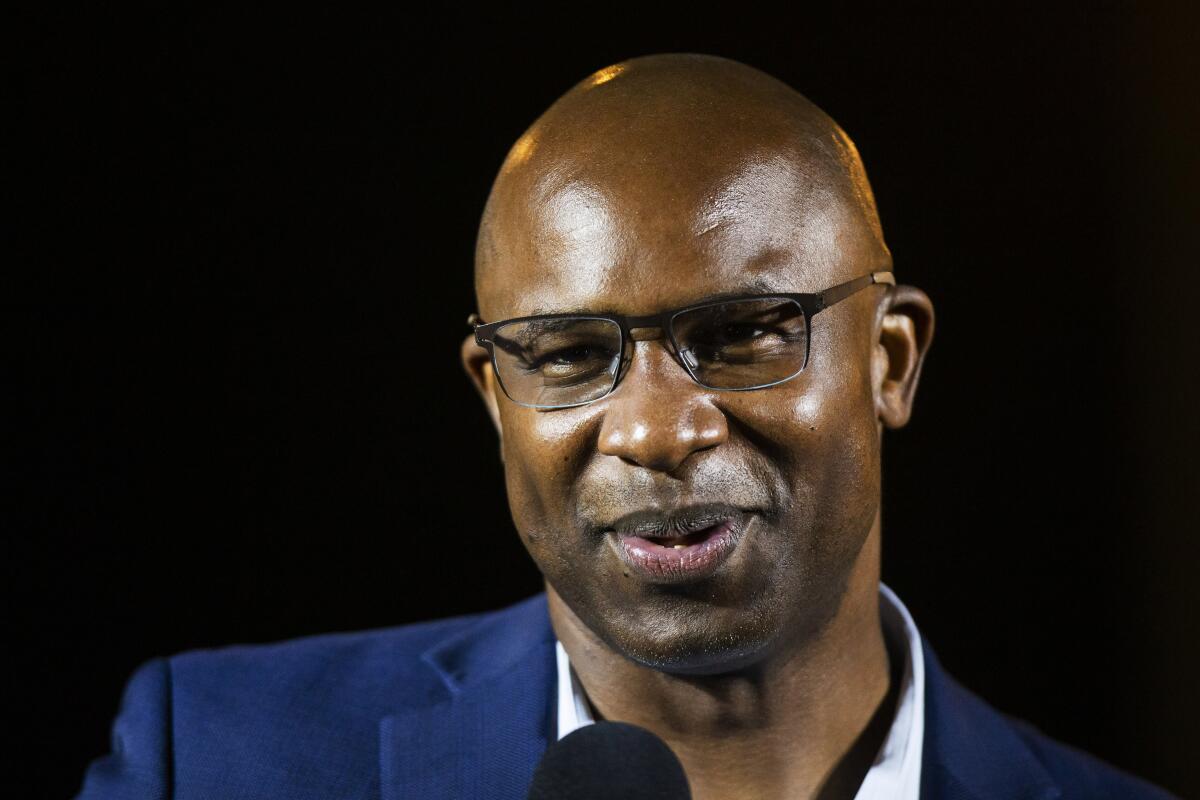
Bowman is only a freshman in the House. But the former middle school principal, like Ocasio-Cortez, ousted a longtime incumbent, beating Rep. Eliot Engel (D-N.Y.).
With Republicans increasingly diving into areas such as LGBTQ youth, transgender athletes and banning books, being an educator makes Bowman uniquely positioned to fight back. He also sits on the House Education and Labor Committee.
“I think he is definitely somebody that people should be watching,” said Camille Rivera, a Democratic consultant at New Deal Strategies. “He comes from education. He has strong followings. He ran in a very contested race and can talk to different types of people and meet people where they are. He’s already stumping all across the country right now, helping other Democrats win. I think he’s somebody to watch.”
In an August appearance on a Sunday political talk show, Bowman notably declined to say whether Biden should seek reelection, insisting that Democrats should focus on keeping the House in the midterm election.
“We’re talking a year or two away,” he said of the next presidential campaign. “I’m not thinking a year or two away.”
Rep. Katie Porter (D-Irvine)

Porter is a rare breed: a progressive who occupies a swing district but who has refused to moderate her views or buck the party on tough votes. She flipped her competitive Orange County seat in 2018 and joined the Congressional Progressive Caucus, of which she’s now deputy chair.
“Katie Porter has a unique appeal” to voters who are also drawn to Warren, Harris and Transportation Secretary Pete Buttigieg, said one Democratic operative who has worked on presidential campaigns and requested anonymity to speak candidly. “It’s a very powerful thing in politics, because it allows you to raise money and then amplify your message in other ways.
“Porter, she’s a progressive, but she’s not Bernie Sanders. She’s not even AOC. They’re friends, but her politics, I think, are to the right of both of them.”
In Porter’s district, that may be a boon. Despite Biden’s low approval rating and voter concerns over inflation, Porter welcomed the president to her district last month.
She has proved in a short time to be one of the most prolific fundraisers in the California delegation, raising almost $7million in her first campaign, nearly $17million in her last campaign and more than $21million through September in the current election cycle.
Her massive hauls as a congressional candidate suggest she could raise the kind of money necessary to be competitive in a statewide race, perhaps for U.S. Senate.
California Democrats are quietly waiting to see whether Sen.
Dianne Feinstein announces next year that she won’t seek reelection in 2024 — which would kick off a fierce primary to succeed the 89-year-old lawmaker in a seat she has held since 1992.
Porter is a former student of Warren and endorsed her campaign in 2020. Before coming to Congress, she was appointed by Harris, then the state attorney general, to oversee a $25-billion
settlement with the nation’s top banks.
Sen. Cory Booker (D-N.J.)
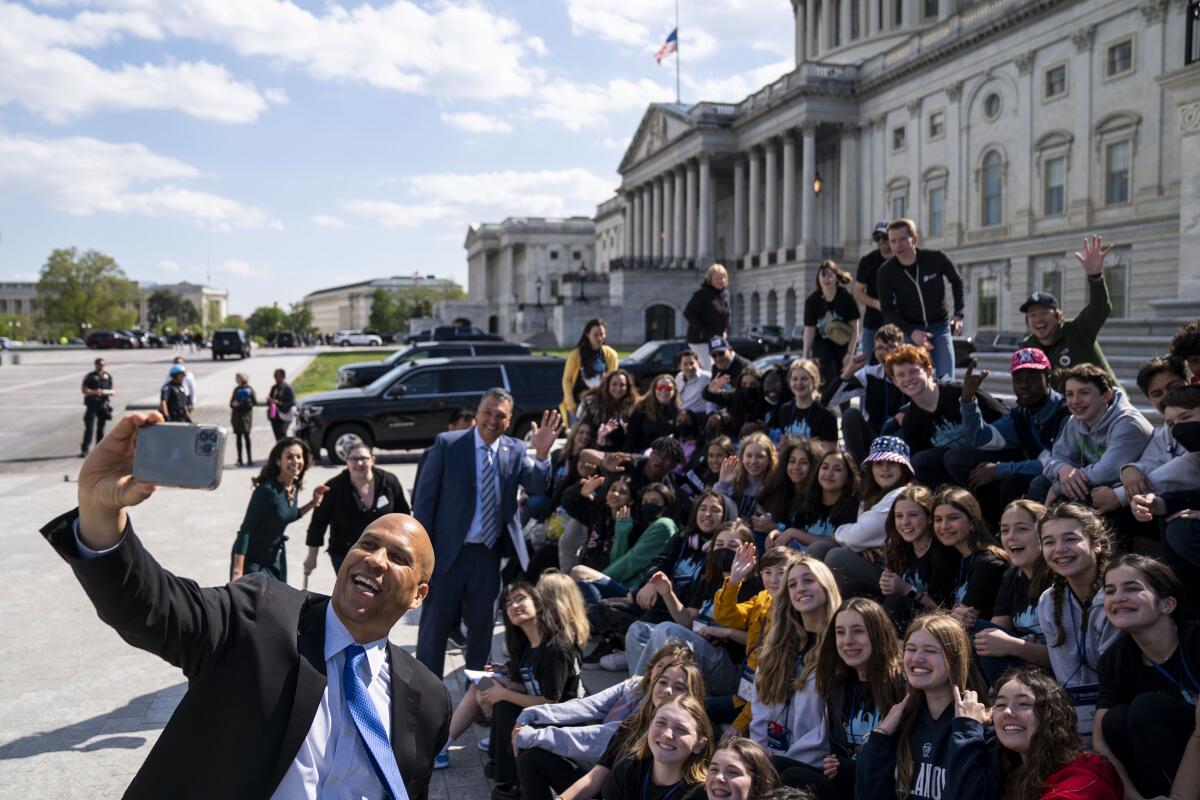
Progressives see Booker as a progressive with an asterisk, given his pragmatic politics. He has already ruled out a run for New Jersey governor in 2025 and said he’ll seek reelection to the Senate in 2026. But who knows what 2028 will hold?
“If you look at his public comments since dropping out of the 2020 race, he has not ruled out another run for the presidency — someday,” said a person familiar with Booker’s thinking.
Booker launched his 2020 bid for president aiming to run a positive campaign that could unite the country. He preached a message of love, but Democratic voters were looking for a fighter who could make Donald Trump a one-term president. Lacking critical resources to continue campaigning and falling short of polling thresholds to make the next debate, Booker suspended his campaign less than a year after its launch.
As a member of the Senate, Booker maintains his national platform. He has campaigned for candidates this fall in Pennsylvania, Georgia, Ohio, Arizona, North Carolina, New Hampshire, Colorado, Michigan, Wisconsin and Nevada.
Booker has also lent his name to raise money online for more than two dozen Democrats in House, Senate and gubernatorial races this cycle.
Should he be reelected to the Senate, his seat on the Foreign Relations Committee will strengthen his foreign policy credentials.
His post on the Judiciary Committee has already given him the high-profile moment of moving to tears Ketanji Brown Jackson, the nation’s first Black female Supreme Court justice. Booker, the only Black member on the panel, told Jackson she “is so much more than [her] race and gender.”
“You have earned this spot,” he told her. “You are worthy.”
More to Read
Get the L.A. Times Politics newsletter
Deeply reported insights into legislation, politics and policy from Sacramento, Washington and beyond. In your inbox three times per week.
You may occasionally receive promotional content from the Los Angeles Times.



